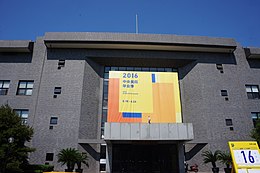Central Academy of Fine Arts
中央美术学院 | |||||||||||||||||||
 | |||||||||||||||||||
Former names | National Beijing Art College[1] | ||||||||||||||||||
|---|---|---|---|---|---|---|---|---|---|---|---|---|---|---|---|---|---|---|---|
| Type | Public | ||||||||||||||||||
| Established | 1918 | ||||||||||||||||||
| President | Lin Mao (林茂) | ||||||||||||||||||
| Party Secretary | Gao Hong (高洪) | ||||||||||||||||||
Academic staff | 572 | ||||||||||||||||||
| Students | 4,700 | ||||||||||||||||||
| Location | , | ||||||||||||||||||
| Campus | Urban, 33 ha (82 acres) | ||||||||||||||||||
| Website | cafa.edu.cn | ||||||||||||||||||
| Chinese name | |||||||||||||||||||
| Simplified Chinese | 中央美术学院 | ||||||||||||||||||
| Traditional Chinese | 中央美術學院 | ||||||||||||||||||
| |||||||||||||||||||
The Central Academy of Fine Arts or CAFA is an art academy under the direct charge of the Ministry of Education of China. The Manila Bulletin calls the school "China’s most prestigious and renowned art academy."[2] It is considered one of the most selective schools in the country and turns away more than 90% of its applicants each year.[3]
Overview
[edit]The history of the National Art School in Beiping (国立北平艺术专科学校) dates back to the founding of the National School of Fine Arts in Beijing in 1918, advocated by the educator Cai Yuanpei. It was the first national school of fine arts in China and also the beginning of Chinese modern education of fine arts. The academy was founded in April 1950, as a result of a merger between the National Art School in Beiping and the department of fine arts at the third campus of North China University. The former principals of CAFA include Xu Beihong, Jiang Feng, Wu Zuoren, Gu Yuan, Jin Shangyi, Pan Gongkai, and Fan Di'an. Lin Mao has been the president since 2023.[4] The current director of academic commission is Jin Shangyi.
The academy comprises six specialty schools: Fine Art, Chinese Painting, Design, Architecture, Humanities and Urban Design. A post-graduate education school and high school of fine arts are also affiliated. There are 534 teachers and staff for 3,800 undergraduate and graduate students and over 100 international students. Its museum of fine arts boasts precious collections, including more than 2,000 Chinese scroll paintings from the Ming dynasty. CAFA edits, publishes and distributes two national first-class academic magazines, "Fine Arts Study" and "Fine Arts of the World".
The design programme of CAFA was renewed in 1995 in the name of the Department of Art Design after a break of some forty years and became the School of Design in October 2002. The university's goal of preparing and training the students as future professionals in design with creative thinking and practical capabilities, the School of Design offers undergraduate, graduate and Ph.D. degrees in programs ranging from visual communication design, product design, fashion design, photography, digital media to design theory and history. The School of Design plays an important role in promoting design in China and is actively involved in various design activities, most notably its designs for the 2008 Beijing Olympics, as well as the establishment of the Academy of Arts & Design at Tsinghua University (previously known as the Central Academy of Fine Art's Huadong Campus).[5][6]
The new CAFA Art Museum, designed by Japanese architect Arata Isozaki, is located at the northeast corner of CAFA campus at No.8, Huajiadi Nan Street, Wangjing, with an area of 3546 m2 and a total floor area of 14,777 m2. The Museum opened in October 2008 for the University's 90th anniversary. The new six-floor museum has several notable collections, including over 2,000 historic Chinese scroll paintings from the Ming Dynasty. The museum hosts rotating exhibitions.[citation needed]
The school drew media attention during the Tiananmen Square protests of 1989 when the students created a large statue called the Goddess of Democracy.[7] Each of the eight art academies signed a statement explaining the purpose of the statue.[8]
In 2018 the asteroid 118418 Yangmei was named in honor of the academy.
Schools and colleges
[edit]
Faculty of Art and Design
[edit]- School of Chinese Painting
- School of Fine Art
- Department of Oil Painting
- Department of Printmaking
- Department of Sculpture
- Department of Mural Painting
- School of Experimental Art
- School of Humanities
- Department of Art History and Theory
- Department of Cultural Heritage
- Non-material Cultural Heritage Research Center
- Information Center
- School of Design
- School of Architecture
- College of City Design
- Department of Information Design
- Publishing Design
- Communication Design
- Commercial Information Design
- Department of Product Design
- Ceramic Design
- Artwork Design
- Interior Product Design
- Jewelry Design
- Department of Space Design
- Department of Video Design
- Animation
- Game Design
- Experimental Movie
- Department of Information Design
- School of Arts Administration and Education
Graduate school
[edit]- Master's Degree Course
- Doctoral Degree Course
Museum of CAFA
[edit]Set up in the early 1960s, the Museum of Central Academy of Fine Arts (formerly CAFA Gallery), has a collection of 13,000 works which cover a wide variety of genres and styles, including representative works by ancient and modern Chinese masters as well as fine student works. Since the incorporation of the foundation of the Academy in 1950 it has contained Chinese painting, oil painting, print, sculpture and folk art such as New Year picture, embroidery and minority ethnic costume and objects, along with Chinese relics of bronze, pottery, engravings and rubbings.[9]
Designed by Arata Isozaki, a renowned Japanese architect, the new museum of CAFA is a building of 14,777 square meters on a land of 3,546 square meters, with four floors above ground and two floors underground. The museum opened in September 2008, together with the collection warehouse, permanent and temporary exhibition halls, as well as supporting facilities including artist studios, lecture and conference rooms and cafeteria and bookstore.
Library
[edit]CAFA‘s Library has a long history. As one of the largest professional libraries in China it has 360,000 books and paintings of various kinds, whose special collection includes woodblock New Year pictures, string-bound ancient books with illustrations, rubbings from stone-engraved portraits of Han Dynasty, tablets of various dynasties and the first-hand copies from engraved seals, etc. The library has reading rooms for art books, social science books and magazines and multi-media reading. The library provides CJFD and CDMD of CNKI e-books on the Shushing website, National Palace Museum-Online and Taiwan Doctor/Master Dissertations Database and its own fine arts reference full-text database and dissertation names in core journals collected by CAFA, etc.
Rankings and reputation
[edit]Central Academy of Fine Arts (CAFA) is ranked No.1 in Fine Arts by the Development Centre for Academic Degrees and Postgraduate Education, Ministry of Education, China.[citation needed] The acceptance rate was only 1.58% in 2019.
It has been consistently ranked the best in China among universities specialized in Arts in the recognized Best Chinese Universities Ranking.[10]
As of 2023, the university was ranked 15th globally for "art and design" in the QS World University Rankings.[11]
Notable alumni
[edit]- Beohar Rammanohar Sinha
- Chen Man
- Fang Lijun[citation needed]
- He Chengyao
- Hou Hanru
- Hung Liu
- Jiang Shuo
- Jin Shangyi[12]
- Old Xian
- Sui Jianguo
- Wang Chunchen
- Wu Guanzhong
- Wu Shaoxiang
- Wu Zuoren
- Xu Bing
- Yan Cong
- Yu Chen
- Yu Xingze
- Zhang Huan
- Yan Ping
See also
[edit]References
[edit]- ^ "About CAFA". Official website of Central Academy of Fine Arts. Retrieved 10 June 2015.
- ^ "The Central Academy of Fine Arts". english.visitbeijing.com.cn. Retrieved 2024-10-18.
- ^ [1] The New York Times
- ^ "中央美术学院-学院概况-学院领导". Central Academy of Fine Arts. Retrieved 20 November 2023.
- ^ "清华大学美术学院(原中央工艺美术学院)历史沿革-清华大学". www.tsinghua.edu.cn. Retrieved 2024-07-21.
- ^ "穿越70年时光,再读新中国首届"民间美术展览会"-清华大学". www.tsinghua.edu.cn. Retrieved 2024-07-23.
- ^ Tsao Tsing-yuan (1994). Jeffrey N. Wasserstrom and Elizabeth J. Perry (ed.). Essay "The Birth of the Goddess of Democracy" from Popular Protest and Political Culture in Modern China. Boulder, Colorado: Westview Press. pp. 140–7.
- ^ Minzhu Han (1990). Cries For Democracy: Writings and Speeches from the 1989 Chinese Democracy Movement. Princeton University Press.
- ^ www.cafa.edu.cn, 中国中央美术学院 China Central Academy of Fine Arts (CAFA). "Museum of CAFA About - 中央美术学院". www.cafa.edu.cn. Retrieved 2018-11-11.
- ^ "ShanghaiRanking's Best Chinese Universities Ranking". www.shanghairanking.com. Retrieved 2023-12-26.
- ^ "QS World University Rankings for Art & Design 2023". Top Universities. Retrieved 2023-12-26.
- ^ "Zhang Dali". Archived from the original on 2011-10-22. Retrieved 2011-10-19.
External links
[edit]
